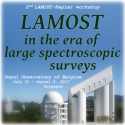Speaker
Dr
Chao Liu
(NAOC)
Description
LAMOST spectroscopic survey has been operated for 5 years and will be end this year. From 2018, the next 5-year plan, the LAMOST-II survey will be started. My talk will be separated into two parts. Firstly, I will highlight some progresses based on the current LAMOST survey data. In particular, I will talk about the current works on the stellar parameter estimations. Two approaches are used for estimation of the stellar parameters: The Cannon and SLAM. The Cannon uses the LAMOST spectra with APOGEE stellar parameters as the training dataset. It can successfully derive alpha-elements, carbon, and nitrogen abundances as well as the effective temperature, surface gravity, and metallicity for the late type giant stars. As an upgrading method, SLAM uses a machine-learning non-linear forward model to replace the oversampled quadratic model in The Cannon. This allows SLAM to be used in a broader parameter space, not only for giant, but also for dwarf stars. The performance of the two methods are quite similar, namely, reach about 0.04 dex for alpha, carbon, and nitrogen abundance. I will also show some interesting test on estimating primary stellar parameters for binary stars with SLAM. This method will be used to derived elemental abundance from the intermediate resolution spectra in the LAMOST-II survey. In the second part, I will introduce the specific plan of the LAMOST-II survey, which is not simply the extension of the current survey, but include some new things, such as the time-domain survey and the intermediate-resolution spectroscopic survey. I will talk about the details of the new intermediate-resolution spectrograph and also some scientific goals.
Primary author
Dr
Chao Liu
(NAOC)
Co-authors
Mr
Bo Zhang
(NAOC)
Prof.
JIANNING FU
(BEIJING NORMAL UNIVESITY)
Prof.
Jianrong Shi
(National Astronomical Observatories, Chinese Academy of Sciences)

